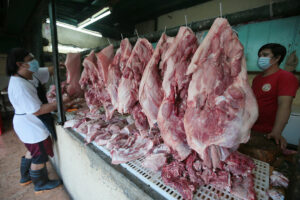— PHILIPPINE STAR/ MICHAEL VARCAS
By Alyssa Nicole O. Tan, Reporter
THE Senate Agriculture, Food and Agrarian Reform Committee was told that the supply of pork exceeded demand in each of the years since 2019, raising questions about the government’s pork import policy.
Senator Cynthia A. Villar, who chairs the committee hearing, on Monday cited data indicating a pork surplus since 2019, suggesting a disconnect between the decision to import and the available pork inventory.
“We should know our local production (and) demand; the difference is what we should import,” she said.
According to Ms. Villar’s data, pork demand was 1.7 million tons in the 2019-2022 period, well below the estimated supply of 2.6 million tons.
“Why is it that production is larger than demand yet we import?,” she added.
One of the resource persons at the committee hearing, who represents the poultry industry, told the panel that the government’s policy over the last few years was to freely allow meat imports to all seeking permits.
“All these years, the private sector’s understanding of the DA’s (Department of Agriculture’s policy) is that imports can come in because we are fully liberalized. The importer just has to click on his computer and the permit will be issued electronically,” United Broiler Raisers Association President Elias Jose M. Inciong said.
“Pork and chicken are the products that don’t need a certificate of necessity to import. Our understanding is that all the rest need the certificate of necessity to import,” he added.
Bureau of Animal Industry Officer-in-Charge Director Paul C. Limson confirmed the lack of controls over imports. “The import application is lodged by the client, so we don’t have direct control over how frequently they do so,” he said.
Ms. Villar asked why the importer had the power to determine appropriate shipment volumes, adding that the government must impose “common sense” limits on permitted quantifies.
“Imports are fine with me if there’s a shortage, to solve temporary short-term problems,” she added. “Those giving the permits want imports because they benefit from it.”
Agricultural Sector Alliance of the Philippines Party-list Representative Nicanor M. Briones said that it was the DA’s responsibility to ensure that farmers do not face unfair competition from imports.
“We are agreeing to import to the extent that farmers lose out,” he said. “It’s the consumer who suffers because of what we are doing.”
He said the government needs to make import decisions with reference to the direction of farmgate prices, by which they can gauge the balance of supply and demand and plan for appropriate import volumes.
“It seems we no longer care about our farmers and consumers,” he added.
“Any industry in this situation will die,” Ms. Villar said, noting that farmers will eventually abandon agriculture because they cannot make a living competing with imports.
Ms. Villar said the Palace must take the initiative in balancing supply, demand, and imports.
Mr. Briones also said that temporary solutions should not be made permanent, such as a recent executive order extending the lower tariff regime for imports of pork, rice, corn and coal, which originally took effect as a measure to contain inflation in 2021.
Signed by Mr. Marcos on Dec. 29 and released on Wednesday, Executive Order No. 10 extended until the end of 2023 the reduced tariffs for pork at 15% (for imports within the minimum access volume quota) and 25% (for those exceeding the quota). The corresponding tariffs were 5% for corn (within the quota) and 15% (beyond the quota), and 35% for rice from all sources, not just Southeast Asian grain.
Coal will remain at zero duty beyond the end of the year, subject to review every six months.
Reynaldo R. Cancio, the National Economic and Development Authority Policy and Planning Group supervising officer, said the extension of the reduced tariffs was meant to be a temporary measure to contain inflation.
“The recommendation to extend was only temporary… so it’s only up to the end of 2023,” he said.
“But then we assessed based on a petition from the public, from the private sector, that it needed to be extended in order to reduce inflation,” he said. “The forecast of the BSP (Bangko Sentral ng Pilipinas), at the time we were assessing, was that the target of 4% maximum inflation for 2022 would be exceeded again in 2023, so we needed to look for ways to manage inflation further.”
Ms. Villar noted however that prices have not fallen even with ample supply due to imports.
“That means (prices are) being controlled by the cartel, (which is) very powerful in the Philippines,” she said.
President Ferdinand R. Marcos, Jr., who is also Secretary of Agriculture, has called the extension of reduced tariffs necessary to “maintain affordable prices for the purpose of ensuring food security, help augment the supply of basic agricultural commodities, reduce the cost of electricity, and diversify the country’s market sources.”
